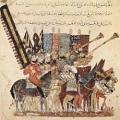155 - Matter over Mind: Ibn Gabirol
Neoplatonism returns in Ibn Gabirol (known in Latin as Avicebron), who controversially holds that everything apart from God has both matter and form.
Themes:
• Ibn Gabirol, The Fountain of Life [Book 3 only], trans. H.E. Wedeck (New York: 1962).
• Ibn Gabirol, The Kingly Crown, trans. B. Lewis (London: 1961).
• Ibn Gabirol, The Improvement of the Moral Qualities, trans. S.S. Wise (New York: 1966).
• Ibn Gabirol, Lebensquelle I-II [Latin text and German trans. of the Fountain of Life, books 1-2], trans. O. Fraisse (Freiburg: 2009).
• J.A. Laumakis (trans.), The Font of Life (Fons Vitae) by Solomon Ibn Gabirol (Avicebron) (Milwaukee: 2014)
• P. Cole, Selected Poems of Solomon Ibn Gabirol (Princeton: 2001).
• J. Dillon, “Solomon Ibn Gabirol’s Doctrine of Intelligible Matter,” in L.E. Goodman (ed.), Neoplatonism and Jewish Thought (Albany: 1992), 43-59.
• R. Loewe, Ibn Gabirol (London: 1989).
• S. Pessin, Ibn Gabirol’s Theology of Desire: Matter and Method in Jewish Medieval Neoplatonism (Cambridge: 2013).
• N. Polloni, M. Benedetto, and F. Dal Bo (eds), Ibn Gabirol (Avicebron): Latin and Hebrew Philosophical Traditions (Turnhout: 2023).
• T.M. Rudavksy, T. M. 1978. “Conflicting Motifs: Ibn Gabirol on Matter and Evil,” The New Scholasticism 52 (1978), 54-71.
Stanford Encyclopedia: Ibn Gabirol

Andalusia


 ..
..



Comments
Query
Hi Peter
and many thanks.
I study with your podcasts.
As immate the prison's officiers allowed me.
A query, if it is possible:
Does Ibn Rushd and Ibn Sina wrote about the "quintessence" ( Anima Mundi/Ether)?
Thanks in advance
a.
In reply to Query by avi
Fifth element
Hi there,
Yes indeed, both of them accept the view (which is standard among followers of Aristotle) that the heavenly bodies are made of an indestructible "fifth element", which is where the word "quintessence" comes from. They both also think the universe is eternal, despite being dependent on God for its existence. They both wrote works based on Aristotle's "On the Heavens" where this topic is explored in depth.
Peter
Links between Ibn Gabriol and John Scotus Eriugena
Hi Peter,
Listening to your podcast on Ibn Gabriol (your podcasts are absolutely brilliant by the way!) I was struck by how his philosophical theories and even creative interests seem to parallel those of John Scotus Eriugena. I have been hoping that you might discuss Eriugena in further length in your podcasts as I have recently found his theories to have connections to certain philosophical musings I have had and now Ibn Gabriol also seems to have struck a resonant chord.
Beyond the connection of their Neoplatonism they also both wrote a dialogue between a teacher and pupil and wrote poetry. Do you think that Ibn Gabriol could have been influenced by Eriugena through some form of cross-cultural interchange in early medieval Europe? Eriugena also had a strong background in both New Testament and Old Testament theology as well as Neoplatonic learning.
I look forward to hearing more on this topic in the forthcoming podcasts.
All the best and Merry Christmas to you.
In reply to Links between Ibn Gabriol and John Scotus Eriugena by Drew McNaughton
Ibn Gabirol and Eriugena
Hi there,
I actually love Eriugena and am looking forward to covering him - I'll probably do an episode on the predestination controversy, in which he was involved, and of course one on the Periphyseon.
Regarding your question I don't think there's any way Eriugena could have influenced Ibn Gabirol, since as far as I know Ibn Gabirol would not have been able to read any sources in Latin. There is the possibility of later influence on medieval Jewish philosophy from Latin scholasticism, like for Gersonides (but this is controversial). Not for Ibn Gabirol though. I think instead it's a matter (pun intended) of common sources or similar sources, i.e. Neoplatonic stuff from late antiquity.
Thanks,
Peter
In reply to Ibn Gabirol and Eriugena by Peter Adamson
Ibn Gabriol and Eriugena
Hi Peter,
Thanks for the response and I look forward to your episodes on Eriugena.
All the best.
Thank you Peter !
Peter, thanks for another year of incredible podcasts. They are always very educational, not only on philosophy but also on the use of giraffe/Buster Keaton analogies as tools for teaching and how to end a podcast with a brilliant pun !!
I very much enjoy my weekly dose of philosophical history, it is the perfect counterpoint to the more contemporary topics talked about on ABC (Australia) Radio National's The Philosopher's Zone podcast
(which is where I first heard you speaking about Averroes).
Thanks again for all of your hard work in putting the show together, and I wish you all the best for the festive season and hope you have a great start to 2014.
I'll be listening again in the new year, and look forward to hearing where our journey takes us next.
See you,
Brett
(aka The Comic Book Evangelist)
In reply to Thank you Peter ! by Brett Harris
2014
Thanks very much! Especially for the rare vote of appreciation for the closing puns. I thought I was the only one who liked them.
I also like the Philosophers' Zone, but I miss the original host Alan Saunders, he was fantastic. The newer ones are also good but I find them a bit more popular in approach, not quite as in-depth.
Happy New Year to you too!
Peter
Nice podcast - but what about Orphaned Land?
Nice podcast, but dude - I was hoping you might relent and play a little of Orphaned Land's metal cover of Ibn Gabirol's liturgical poem, Shofet Kol Ha'aretz (Olat Hatamid):
Studio version: http://www.youtube.com/watch?v=9TbzEjWsONU
Live: http://www.youtube.com/watch?v=M4z8v_UFPSA
In reply to Nice podcast - but what about Orphaned Land? by Berel Dov Lerner
Orphaned Land
I can't say I wasn't tempted. But apart from the copyright issues there is the danger of blasting people's eardrums apart.
I wonder what Ibn Gabirol himself would make of it? "Bemused" might be the right word.
In reply to Orphaned Land by Peter Adamson
If not Orphaned Land - at least Berry Sakharof
For mellower modern versions of Ibn Gabriol, you've got Berry Sakharof's 2009 album of his poems, for instance "Behayieyhem adumi hasefatot":
http://www.youtube.com/watch?v=LhB27_ECy8I&list=PLFAD44F8ECBD0C607
Not in verse?
Hi Peter,
Here's your number one fan (I'm sure you have so many of us). Just dropping a line to say how excited I was to think that you were gonna do this podcast in rhyme! And then oh dissappointment! And yes, I'm sure it's very challenging, though you seem to do it very well.
Thanks for introducing us to islamic philosphy. I'm currently reading The Conference of the Birds, and wow! I'm in awe at the transcendental beauty of mystical poetry. Unbelievable, I'm amazed at what an elightened mind can achieve, or should I say what a mind touched by God can achieve? (no offense to other philosophers)
Also, thank you so much for sharing all this amazing knowledge with us, I has truly nourished my mind and life. Please don't stop.
I can't wait for the rest of the episodes.
Greetings from Vancouver!
Your Mexican amigo, Jorge
In reply to Not in verse? by Jorge
Versification
Thanks so much! Glad you are enjoying the series. I think as modern readers we tend to forget how important poetry was in these cultures - true of all the times and places I've covered so far but perhaps especially the Islamic world. You will probably like the Rumi episode (178) when you get there.
Introductions
Came across your podcast by complete chance Philosophy is irrelevant was my stance knowledge and wisdom you do provide A lifetime of study just couldn't suffice I appreciate your introductions the most Because they act as a key i suppose To unlock the paradigm of our subject matter and if that does work, there's always Hiawatha!
In reply to Introductions by Haseef
Poem
Next time I want to include a poem in a script, I'll be contacting you to do the ghostwriting! Thanks.
Help Asking
Hi,Peter,
I am a Chinese middle school student who is doing a school project about ibn Gabirol. As some reasons, it is nearly impossible for me to get his works or other research datas. I really need your help to complete my project. Would you please send me your transcript of this podcast to my email address?I will make good use of it and protect your copyright.
Thanks you very much!
P.S.Please forgive my bad English writing.
In reply to Help Asking by ZenonKronos
Ibn Gabirol
Thanks for your interest. Send me an email to peter.adamson@lrz.uni-muenchen.de and I will send you a copy of the chapter on Ibn Gabriol from the book version of the podcast.
Hey, it's the guy! The guy…
Hey, it's the guy! The guy with the homoerotic love poetry that I mentioned way back when! I feel like I just saw a celebrity cameo on a TV show.
Add new comment